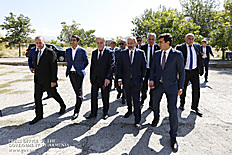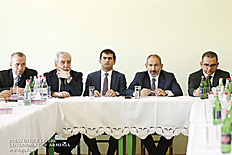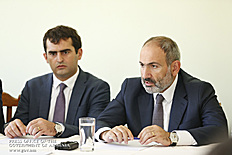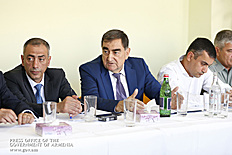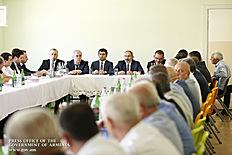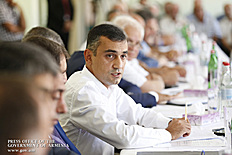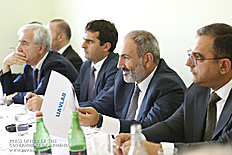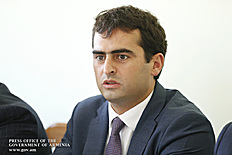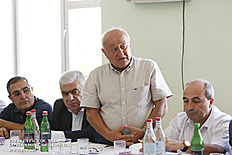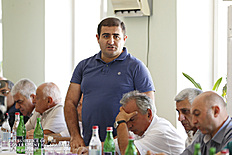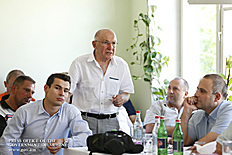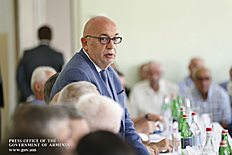Statements and messages of the Prime Minister of RA
PM: “The Military-Industrial Complex should be the driver of Armenia’s knowledge-based economy”
more 9 photos
Accompanied by Minister of High-Tech Industry Hakob Arshakyan and Minister of Economy Tigran Khachatryan, Prime Minister Nikol Pashinyan today visited Military-Industrial Company N in Kotayk Marz of Armenia.
The Premier was introduced to the Company’s military products, the manufacturing process and development prospects, after which the Prime Minister met with members of the Union of Military Industries and heads of military-industrial companies.
Greeting those present, Nikol Pashinyan noted that meetings like that ought to be held more frequently: “I think that yesterday we witnessed a very important event for Armenia’s economy and its international economic status. Moody’s has upgraded the sovereign rating of Armenia, and there is a point in the justification that goes in tune with today’s agenda. Perhaps the most important justification is that the Armenian government has adopted a strategy and policy to develop knowledge-based sectors in the economy, and this is indeed the case.
I have said several times that our vision of Armenia’s economy is as follows: Armenia should be an industrial country. In industry and in the economy in general, our government prioritizes the Military-Industrial Complex provided that it should comply with all modern technological indicators or, at least, move in that direction.
In the long run, we will have to implement technology-targeted initiatives and make technological innovations. Of course, the Military-Industrial Complex has several key meanings for the government, all of which are of strategic nature.
The first is that our country should have a strong military-industrial complex; it comes from the security environment in which we find ourselves today. The security needs of our country evoke it of course.
The second is the development of the economy, the generation of new jobs and the vision of making Armenia a country with highly skilled workforce. The Military-Industrial Complex is an area where even a blue-collar worker should have a qualification, that is, we need highly skilled workers, craftsmen, etc.
Of course, the export strategy is also important to us, and our strategy should be to help the Military Industrial Complex get involved in foreign markets. And to solve these complex problems, we have set up the Ministry of High-Tech Industry. First of all, we had in mind the development of our military-industrial complex. But we all understand that we must be able to secure public orders so that the Complex could live, develop and supply competitive products. This is our most important goal as the initial stage of development.
Unfortunately, everything went wrong in this area. I mean the state-funded system, and when we formulate a political intention, we must understand the question thoroughly. In saying that we must ensure a state order for the Military-Industrial Complex, we mean that its purpose should be not only to uphold the Complex, but also to help it become competitive in foreign markets.
Of course, this will not happen within a day, but I think it crucial to underscore that our intention is not to ensure that the military complex survives owing to the narrow logic of state orders, but that the Katter should help the Military-Industrial Complex develop and compete in foreign markets, as well as in the domestic market.
I would also like to highlight the system’s competitiveness on the domestic market, because, for example, if it turns out that we can buy, import, the same product much cheaper, we are faced with a very difficult choice, especially from the point of view operational safety management logic, because security is not only about the long-term problems, but also the short-term problems that need to be solved today, now, in the coming months. But of course, we must also consider other factors - what and where we can import in certain crisis situations; and how we can lose that opportunity, how we can ensure and meet our security needs in this situation.
The political finding is that we need a knowledge-based industrial economy. The Military-Industrial Complex should be the driver of a knowledge-based industrial economy.
We must support the Military-Industrial Complex in any way possible to make it competitive in both domestic and foreign markets, and therefore the dialogue between the Government and the Military-Industrial Complex should be focused on whether we could develop the sector in a way to avoid the need of artificial respiration or artificial nutrition, so that we can increase its competitiveness, and also on how we can provide the widest possible spectrum of military-industrial items in order to create high-quality jobs, provide for the country’s security needs and, ultimately, ensure economic development and generate revenue for the state budget.
This should be a highlight on our agenda. Of course, this topic has long been in the air; it is a process of continued communication, and I am convinced that the Ministry understands that this is the chief task.”
A number of proposals and recommendations were voiced by private sector representatives during the exchange of views that followed. Reference was made to the organization of military-industrial facilities, the introduction of cutting-edge technologies, as well as to the efficiency of military-industrial enterprises, staff training and legislative questions.
Summing up the discussion, the Prime Minister stressed that the Government has set itself ambitious tasks in this field. Nikol Pashinyan considered it necessary to make out a roadmap for the development of the Military-Industrial Complex in cooperation with the public and private sectors.
